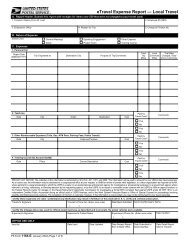NALC FMLA Forms - branch 38
NALC FMLA Forms - branch 38
NALC FMLA Forms - branch 38
Create successful ePaper yourself
Turn your PDF publications into a flip-book with our unique Google optimized e-Paper software.
"Serious Health Condition"Definition under Family and Medical Leave Act of 1993A "serious health condition" of a familymember is defined in the <strong>FMLA</strong> regulations asany illness, injury, impairment or physical ormental condition that involves one of thefollowing:1. Hospital care:This means inpatient care (that is, anovernight stay) in a hospital, hospice orresidential medical care facility, includingany period of incapacity or subsequenttreatment in connection with or consequentto such inpatient care.2. Absence plus treatment:A period of incapacity of more than threeconsecutive calendar days (including anysubsequent treatment or period of incapacityrelating to the same condition), that alsoinvolves:3a. Treatment two or more times by ahealth care provider, by a nurse orphysician's assistant under direct supervisionof a health care provider, orby a provider of health care services(e.g., physical therapist) under ordersof, or on referral by, a health care provider;orb. Treatment by a health care provider onat least one occasion which results ina regimen of continuing treatment 4under the supervision of the health careprovider.3. Pregnancy:Any period of incapacity due to pregnancy,or for prenatal care.4. Chronic conditions requiring treatments:A chronic condition whicha. Requires periodic visits for treatment by ahealth care provider, or by a nurse or physician'sassistant under direct supervision of ahealth care provider;b. Continues over an extended period of time(including recurring episodes of a single underlyingcondition); andc. May cause episodic rather than a continuingperiod of incapacity (e.g., asthma, diabetes,epilepsy).5. Permanent/long-term conditionsrequiring supervision:A period of incapacity which is permanent orlong-term due to a condition for which treatmentmay not be effective. The employee or familymember must be under the continuing supervisionof, but need not be receiving active treatmentby a health care provider. Examples includeAlzheimer's, a severe stroke, or the terminalstages of a disease.6. Multiple treatments(non-chronic conditions):Any period of absence to receive multiple treatments(including any period of recovery therefrom)by a health care provider or by a provider of healthcare services under orders of, or on referral by, ahealth care provider either for restorative surgeryafter an accident or other injury, or for a conditionthat would likely result in a period of incapacity ofmore than three consecutive calendar days inthe absence of medical intervention or treatmentsuch as cancer (chemotherapy, radiation,etc), severe arthritis (physical therapy), kidneydisease (dialysis).1Here and elsewhere on this form, the information sought relates only to the condition for which theemployee is taking <strong>FMLA</strong> leave.2"Incapacity," for purposes of the <strong>FMLA</strong>, is defined to mean inability to work, attend school or performother regular daily activities due to the serious health condition, treatment therefor, or recovery therefrom.3Treatment includes examinations to determine if a serious health condition exists and evaluations of thecondition. Treatment does not include routine physical examinations, eye examinations, or dental examinations.4A regimen of continuing treatment includes, for example, a course of prescription medication (e.g., anantibiotic) or therapy requiring special equipment to resolve or alleviate the health condition. A regimen oftreatment does not include the taking of over-the-counter medications such as aspirin, antihistamines, orsalves; or bed-rest, drinking fluids, exercise, and other similar activities that can be initiated without a visit to ahealth care provider.October, 1995 <strong>NALC</strong> <strong>FMLA</strong> Form 2 (Page 2 of 2)











